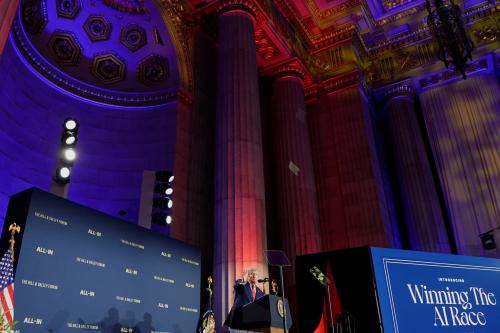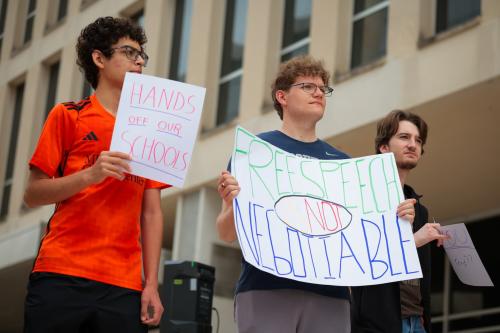President Trump’s science and technology adviser recently spoke about ushering in a “Golden Age of Innovation,” seeking to maintain American technological leadership while revitalizing the nation’s scientific enterprise. As part of this plan, the administration realigned funding to prioritize AI and related research while cutting money from other fields, especially in those believed to promote diversity, equity, and inclusion (DEI) efforts. But the changes—described by The New York Times as driving science funding to its lowest level in 30 years—could affect a range of technology sectors, including artificial intelligence (AI), and the university labs that support them.
While Trump touts American innovation and seeks to “remove barriers” to American leadership in AI and “propel [the U.S.] to new heights of scientific and economic achievement,” the institutions that have driven many of these technological innovations are under threat. University labs are now losing funding despite many of these entities being at the forefront of research and development, which may likely stall U.S. global innovation. What’s notable is that technology companies—longtime collaborators with colleges and universities—stand to lose the most at a time when the pace of innovation in both established and emerging technologies is accelerating in the U.S. and globally.
Research partnerships have fueled US innovation
For decades, private companies and universities have collaborated on research and development (R&D). Over a century ago, partnerships formed around agricultural innovation, and ever since, these relationships have evolved and expanded into a variety of fields, from physics to computer science. Notable companies like General Electric, Siemens, and IBM have long collaborated with universities, and Big Tech companies like Microsoft, Amazon, and Facebook have adopted the strategy over the years. Now, areas ripe for innovation like space, quantum computing, machine learning, energy, and other forms of intersectional research may be threatened if universities are prevented from exploring and experimenting in breakthrough areas.
In fact, despite the administration’s claims that cuts to the National Science Foundation’s (NSF) funding reflects a realignment of priorities to center AI and related research, these areas are still affected by the shrunken budget. Many places have been forced by the fiscal cuts to terminate staff and scale back their research activities. Within funding directed at computer science, cyberinfrastructure research is the only area slated for an increase, while research on emerging technologies, human-computer interaction, and security faces steep cuts—amounting to a 31% overall reduction. Although categories like AI and quantum information science are exempt from NSF cuts and may see modest funding increases, researchers argue those gains are minimal when adjusted for inflation and offset by steep declines in indirect cost recovery from federal agencies. The proposed budget would also make new grants much more competitive, with some estimating the grant success rate will drop from 26% to 7%. This could stifle research in AI and quantum computing and harm young researchers at the beginning of their careers.
Colleges and universities not only propel innovation but also train the next generation of scientists and innovators. Students who learn from top researchers or financially endowed universities help fuel a more expansive pool of talent for both the public and private sectors. For example, graduates from top universities like the Massachusetts Institute of Technology (MIT) are regularly sought out by big tech companies, and in 2024, nearly one-fifth of the school’s graduates with a bachelor’s or master’s degree went on to work for start-ups. Threats to research funding, combined with immigration restrictions that prevent many foreign students from remaining in the U.S., could widen existing talent gaps in the technology workforce.
The impact of attacks on research in the US
Limits on research and development, along with restrictions on international students coming to the U.S., could hurt the country’s competitiveness in the global economy. The U.S. has long attracted researchers and students worldwide, drawn by its renowned universities and history of technological breakthroughs. But the drain of talented scientists and researchers coupled with a lack of support for their work is antithetical to expanding the pipeline. Attacks on efforts to increase diversity in these fields will also lend to a depleted pool, as programs may no longer encourage or provide the resources for women, racial minorities, and foreign students to pursue or access scientific fields. In the U.S., the shortage of computer scientists, and other professionals with a science, technology, engineering, and math background (STEM), has been widely discussed for years, especially during a time of accelerated technological growth—even with major gaps showing up in the federal government. Most native-born Americans are not entering these fields, and that trend, combined with the immigration crackdown, limits the number of students earning STEM degrees.
The lack of experimentation on college and university campuses can lead to the stagnation of big, new ideas, especially when the intellectual curiosities of emerging scientists are thwarted and unsupported. These trends could result in losses for the public and private sectors, which may struggle to compete with international competitors without comparable access to talent, both within their own teams and through partnerships. In fact, some companies around the world, and especially in China, are doubling down—investing even more in technology research in areas where the U.S. could fall behind.
The tech industry must be more vocal
Tech companies have long supported immigration policies and higher education research and development that bolster high-skilled workers, expand the pipeline for open roles, and provide support to colleges and universities through endowments and external funding that supplement public dollars. Many of these issues were raised with the Trump administration during his first term, though some companies have recently shifted focus to emphasize creating opportunities for Americans, especially in light of current policies.
But with colleges and universities facing cuts and increased difficulty attracting international talent, tech companies have much to lose by staying quiet in the face of dramatic policy changes. Having as much top talent as possible is paramount to maintaining American innovation, especially when other countries are competing for the same scientists and innovators. With news of deferring student visas, Chinese universities may divert many of these students from around the world to their own educational institutions. Without addressing the administration’s policies, companies could face losses or, at minimum, setbacks in developing new ideas.
Big tech companies aren’t the only ones who will be impacted by the disintegrating support of academic research. Up-and-coming leaders at tech start-ups are similarly vulnerable in their inability to rely on programs and mechanisms that encourage their participation in the research space. This loss of diverse ideas and researchers could weaken the innovation ecosystem, as not all consumers have the same needs and not all products are designed to scale universally.
If American competitiveness and technological discovery dwindle compared to global competitors like China, the nation will face even bigger challenges than those discussed here. Trump promised to support and grow U.S. tech companies. The tech sector may need to renew its support for the institutions that helped drive American innovation—before the country risks losing its competitive edge.
-
Acknowledgements and disclosures
Microsoft, Amazon, and Meta are general, unrestricted donors to the Brookings Institution. The findings, interpretations, and conclusions posted in this piece are solely those of the authors and are not influenced by any donation.
The Brookings Institution is committed to quality, independence, and impact.
We are supported by a diverse array of funders. In line with our values and policies, each Brookings publication represents the sole views of its author(s).








Commentary
Attacks on research and development could hamper technological innovation
June 23, 2025